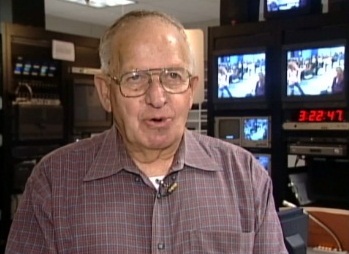Topeka station loses a reliable engineer who’s seen it all
The professional video industry's #1 source for news, trends and product and tech information. Sign up below.
You are now subscribed
Your newsletter sign-up was successful
WIBW, the CBS affiliate in Topeka KS, has announced that veteran broadcast engineer Elmer Gunderson, the station’s longest-tenured employee who started in November 1955 (just two years after the station officially went on the air), has died of cancer.
Perhaps fittingly, in a 2008 interview with the Topeka Capital-Journal, Gunderson related his love for the broadcast business and how long he might last.
“It's still fun to me to come to work,” he said then, at 76 years old. “Probably by the time I’m 80 I might decide that that's enough.”
He was 81 years old and worked right up until last month (April) when his health declined. He passed away on May 19 and would have marked 58 years on the job as the station celebrates its 60th anniversary this fall.

It was Nov. 9, 1955, when Gunderson, fresh out of the Navy (where he served as an electronics technician), was looking for a radio-engineering job to earn money for college. The local WIBW Radio had no openings, but sister TV station WIBW-TV did. Gunderson went on to oversee the station’s move from black/white to color, analog to digital, then to high definition broadcasting.
“[My boss at the time] asked if I had any experience in television,” Gunderson said in a 2004 interview, while being inducted into the Kansas Association of Broadcasters Hall of Fame. “I said no. He said ‘do you want to learn?’ And I said ‘that would be all right.’”
Today WIBW-TV broadcasts a digital signal on VHF channel 13 (it is the only commercial station in Topeka on the VHF band) and augments that with a digital translator on UHF channel 44. The station has dominated the market for as long as records have been kept and claims many technical firsts in the market. It was the first to broadcast in color, the first to use a live microwave truck, and is currently the only Topeka station with an ENG live truck. On February 23, 2012, beginning with its 6 p.m. newscast, WIBW-TV became the first television station in Northeast Kansas to broadcast its local newscasts in high definition.
The professional video industry's #1 source for news, trends and product and tech information. Sign up below.
“A couple years after I started, I got an offer for another job,” Gunderson said, “but, going to school, I thought I'll just stay. And I stayed and I stayed.”
For 35 years, Gunderson served as WIBW's chief engineer. More recently he served as the station’s satellite coordinator. Known for his ingenuity, when the station began broadcasting horse races from Ruidoso, New Mexico, Gunderson and his fellow engineers found a spot for the dish to send out the signal—on a mountainside, behind the trailer home of a man who let them plug into his outlet for power.
When the phone company wanted to charge $50,000 to relay a signal for televised Landon Lectures from Kansas State University, Gunderson and the crew found another option.
“They came up with the idea of putting a bus in the middle of a field in the Flint Hills and then it would relay the signal from Manhattan to there, to the station,” Jim Hollis, the station’s former news director, said.
The mid 1980s brought remote satellite technology to Topeka with Elmer literally driving the satellite remote truck, logging more than 200,000 miles to cover everything from the Miss America Pageant in New Jersey, to San Diego and New Orleans for Super Bowls. He even covered the 2008 NCAA Men's National Championship Game in San Antonio.
The station’s former general manager, the late Jerry Holly praised Gunderson's knowledge in his hall of fame tribute speech in 2004.
“He’s forgotten more than most people ever learned and he’s proven it over and over,” Holly said.
